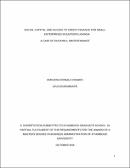| dc.description.abstract | The study topic was social capital and access to credit finance for small enterprises in Eastern Uganda, a case of Duckhill MicroFinance. Small enterprise owners that possess social capital receive preferential treatment and gain access to embedded resources(credit finance) in their social networks. In regards to Duckhill Microfinance, small enterprise owners with social capital apply for credit but are unable to access the credit finance that is adequate, frequent and when they access such credit is very expensive. The study had the following objectives: to establish the relationship between generalized norms of social capital and access to credit finance, to establish the relationship between interaction, everyday sociability of social capital and access to credit finance, to establish the relationship between neighborhood connections and access to credit finance, to establish the relationship togetherness of social capital and access to credit finance. The design of the study was a case study of Duckhill Microfinance in Eastern Uganda, in which a sample of 353 respondents were used, in which 220 respondents replied back. The sampling procedure used was Simple random sampling and Purposive Sampling. The findings of the study showed that a positive significant relationship (r=.395) ,P<0.01 between generalized norms of social capital and access to credit finance. The findings also showed that a positive significant relationship (r=.209),P<,0.01, between interaction, everyday sociability of social capital and access to credit finance. The finding showed that a positive significant relationship (r=.261) , P<0.01 between neighborhood connections of the social capital and access to credit finance. The findings of the study showed a positive significant relationship ( r=.397) P<0.01 between togetherness of social capital and access to credit finance. It is recommended that small enterprise owners demonstrate high social capital through interpersonal trust and reciprocity in social groups they belong and when doing business. Small enterprise owners must conduct social interactions through regular meetings where soft information is exchanged with the loan officers. Small enterprise owners should get involved in association activities and savings groups and display solidarity, cohesion and reciprocity through extending resources, favors to other members. This can greatly improve on their social capital and enable improved access to credit finance. | en_US |

